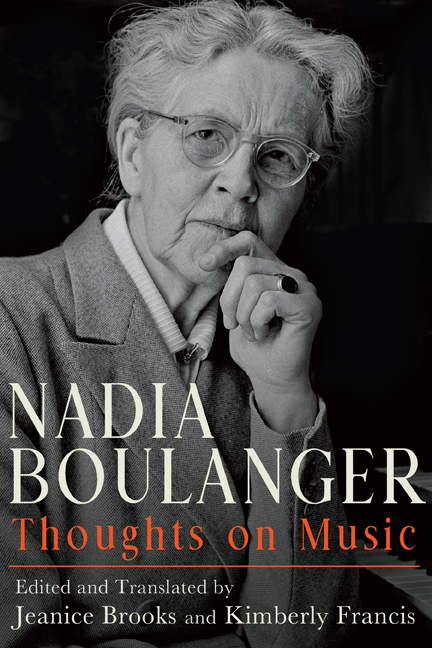Book contents
- Frontmatter
- Contents
- List of Illustrations
- Acknowledgments
- Editorial Apparatus and Critical Notes
- Note on Translations
- List of Abbreviations
- Timeline of Nadia Boulanger’s Life
- Introduction
- Part One Journalism, Criticism, Tributes
- Part Two Lectures, Classes, Broadcasts
- Bibliography of Nadia Boulanger’s Published Writing
- General Bibliography
- Index
“Concerts Koussevitzky,” Le Monde Musical 32, nos. 23 and 24 (December 1921): 400–401 (excerpt)
Published online by Cambridge University Press: 15 October 2020
- Frontmatter
- Contents
- List of Illustrations
- Acknowledgments
- Editorial Apparatus and Critical Notes
- Note on Translations
- List of Abbreviations
- Timeline of Nadia Boulanger’s Life
- Introduction
- Part One Journalism, Criticism, Tributes
- Part Two Lectures, Classes, Broadcasts
- Bibliography of Nadia Boulanger’s Published Writing
- General Bibliography
- Index
Summary
Concerts Reviewed
November 10, 1921
Oberon, J. 306, “Overture,” Carl Maria von Weber
Nocturnes, “I: Nuages,” “II: Fêtes,” Claude Debussy
Khovanshchina, op. 5, “Prelude,” Modest Moussorgsky
Skazaniye o nevidimom grade Kitezhe i deve Fevronii [Legend of the Invisible City of Kitezh and the Maiden Fevroniya], Introduction: “Paean to the Wilderness,” Entr’acte: “'The Battle of Kerzhenets,” Nikolay Rimsky-Korsakov
Skazka o Tsare Saltane, o sïneyego slavnom i moguchem bogatïre knyaze Gvidone Saltanoviche i o prekrasnoy Tsarevne Lebedi [The Tale of Tsar Saltan, of his Son the Renowned and Mighty Bogatïr Prince Guidon Saltanovich, and of the Beautiful Swan Princess], Act III, 2, entr’acte: “Flight of the Bumblebee,” Nikolay Rimsky-Korsakov
Trois poèmes de Stéphane Mallarmé, Maurice Ravel
Symphony no. 5, C minor, op. 67, Ludwig van Beethoven
Koussevitzky Concerts
Each work carries within it a particular dynamism; to be an orchestral conductor is, first of all, to perceive this dynamism, then to have a power of attraction great enough to make the orchestra and the audience feel it. The gestures of the conductor have a role in this domain that is insufficiently defined and too often controversial. Certainly, if the gestures have no logic, no serious reason to be made, it goes without saying that they are ridiculous from the start and that they are always overdone. It is the same for instrumentalists who sit carelessly, and move for the sake of moving, or as a result of involuntary reflexes arising from a lack of knowledge of the possibilities of muscular relations; yet, on the instrumentalist's position, on the equilibrium between the effect that he seeks to obtain and the effort he makes to achieve it, depend his independence, his stamina, and his authority. The orchestral conductor must know his technique from the physical perspective with the same conscientiousness as a pianist, an organist, or a singer. On the surface, it seems as if the physical requirements here are less important, and the technique easier, and this is because we confuse useless gesticulation with the intentional and considered plastic enactment of a completely interior conception.
- Type
- Chapter
- Information
- Nadia BoulangerThoughts on Music, pp. 180 - 185Publisher: Boydell & BrewerPrint publication year: 2020



